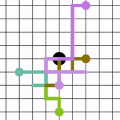The Maximum Matching problem has a quantum query complexity lower bound of $\Omega(n^{3/2})$ for graphs on $n$ vertices represented by an adjacency matrix. The current best quantum algorithm has the query complexity $O(n^{7/4})$, which is an improvement over the trivial bound $O(n^2)$. Constructing a quantum algorithm for this problem with a query complexity improving the upper bound $O(n^{7/4})$ is an open problem. The quantum walk technique is a general framework for constructing quantum algorithms by transforming a classical random walk search into a quantum search, and has been successfully applied to constructing an algorithm with a tight query complexity for another problem. In this work we show that the quantum walk technique fails to produce a fast algorithm improving the known (or even the trivial) upper bound on the query complexity. Specifically, if a quantum walk algorithm designed with the known technique solves the Maximum Matching problem using $O(n^{2-\epsilon})$ queries with any constant $\epsilon>0$, and if the underlying classical random walk is independent of an input graph, then the guaranteed time complexity is larger than any polynomial of $n$.
翻译:对于以邻接矩阵表示的具有n个顶点的图,最大匹配问题的量子查询复杂度下界为$\Omega(n^{3/2})$。目前最佳的量子算法查询复杂度为$O(n^{7/4})$,这相较于平凡上界$O(n^2)$有所改进。构建一个查询复杂度优于上界$O(n^{7/4})$的该问题量子算法仍是一个开放问题。量子行走技术是一种通过将经典随机行走搜索转化为量子搜索来构建量子算法的通用框架,并已成功应用于为另一问题构建具有紧致查询复杂度的算法。本研究表明,量子行走技术无法产生能够改进已知(甚至平凡)查询复杂度上界的快速算法。具体而言,若采用已知技术设计的量子行走算法以$O(n^{2-\epsilon})$查询(其中$\epsilon>0$为任意常数)解决最大匹配问题,且底层经典随机行走独立于输入图,则其保证的时间复杂度将超过n的任意多项式。




